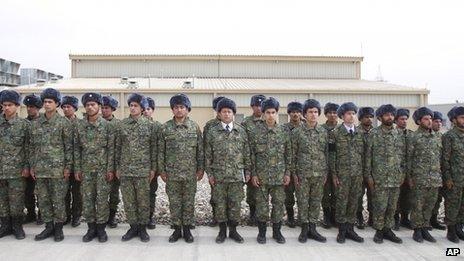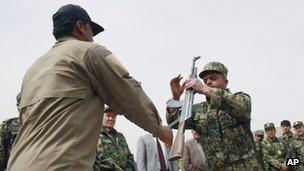Afghanistan security firm ban stirs Western fears
- Published

Foreign diplomats are doubtful that the APPF is ready to assume its responsibilities
Afghanistan's interior ministry has set a fresh deadline - this Wednesday - for private security firms to end operations in the country. The government has extended this deadline several times in the past. But as the BBC's Bilal Sarwary reports from Kabul, international aid workers and diplomatic missions view the ministry's announcement with scepticism and concern.
The demobilisation of private security companies was among the key election promises made by Hamid Karzai when he contested presidential elections for a second term in August 2009. Mr Karzai said then that the firms had become a parallel security system and were causing obstructions to the development of Afghan government forces.
Afghans in general have welcomed the attempts to limit the operations of these companies which employ about 40,000 people - because some are accused of involvement in highway robberies and high-profile shootings.
But international aid agencies, non-governmental organisations and foreign missions say that the absence of private security guards threatens their operations in Afghanistan as they rely heavily on them.
From Wednesday, many security companies will no longer exist - apart from those which provide security to embassies and military bases and those that have acquired new licenses to operate as risk management firms.
The issue has become so sensitive that few people are willing to speak on the record.
'Huge task'
But one senior western aid worker with extensive experience in Afghanistan told the BBC that private security firms "act as a buffer between us and the Taliban, who are always conspiring to damage and stall development and reconstruction projects".

All around the country private security guards have handed in their weapons
He said Afghanistan would lose billions of dollars' worth of development projects if aid agencies left the country because of the lack of security.
Although the Afghan government has promised to provide security to international aid groups active in the country, not many in these agencies are taking this offer too seriously.
"The Afghan government is simply not ready or capable of carrying out this huge task," said a US aid worker.
"I think the government has rushed into the decision to ban private security firms without fully considering the consequences of such a move."
With most of the country's armed forces and police busy fighting the insurgency, the interior ministry is raising a special branch of the police - the Afghan Public Protection Force (APPF) - to take over the duties of private security firms. But officials working with international missions said they do not think that the force is ready to assume its responsibilities.
"The government has not been able to tackle Taliban infiltration, the problem of rogue soldiers and drug addiction in the Afghan National Army and police," one western diplomat said.
"Can it assure us that the APPF will not suffer from these ills? I would like to know what the interior ministry is doing to stop drug addicts from getting into APPF? What about Taliban infiltrators?" she asked.
'Long and painful'
The interior ministry, however, dismissed these concerns.

Private security firms have become a source of friction between Kabul and its western allies
"The APPF is a 10,000-strong force with uniforms, vehicles and weapons," ministry spokesman Sediq Sediqqi told the BBC.
"Biometric data of each and every soldier has been recorded, his background checked and credentials vetted by intelligence agencies."
It is the same recruitment procedure by the Afghan National Police, Mr Sediqqi said.
A senior official at the ministry said the government was aware that the transition from private security firms to the APPF would be long and painful.
"But we do have to take over this task someday," he said. "Think of the jobs generated by APPF, think of the revenues the government will earn."
Some aid missions such as USAID (US Agency for International Development) say they have already contracted the services of the APPF.
"We have approximately 100 projects ongoing in Afghanistan," said Ken Yamashita, director of USAID in Afghanistan.
"Of these, we have identified 32 that would require APPF support. We have already signed up the APPF for 16 of them."
Mr Yamashita said that the best security comes from the Afghan people themselves.
"About 65 of our projects are working in the community, without any security restrictions. This indicates the support and confidence the communities have in our projects," he said.
Some western officials say that another worry is the future of 40,000 people employed by private security firms.
"What will they do when these companies are banned?" one official asked.
"In the absence of alternative employment, there is a real and grave danger of them becoming robbers or, even worse, ending up in the Taliban."
The issue of private security firms has become a source of friction between Kabul and its western allies, especially Washington.
Western diplomats say the move will not come without a price tag.
"Since the Afghan government announced its decision to dissolve private security firms, developmental projects worth $2bn (£1.25bn) have been put on a hold by foreign governments," one official said.
- Published27 October 2010
- Published6 December 2010
- Published3 October 2010
- Published17 August 2010
- Published17 August 2010